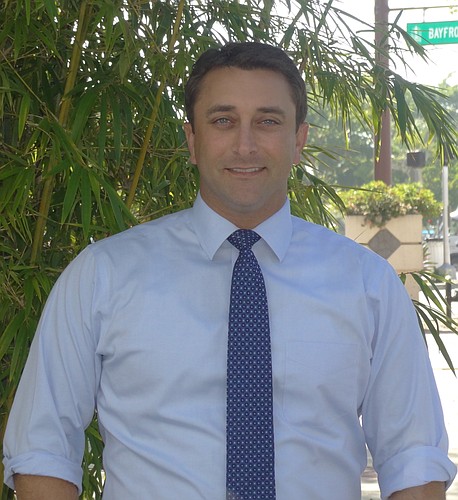- December 22, 2024
-
-
Loading

Loading

After resigning from his position as a state prosecutor last spring, Hagen Brody took a job with a private law office — but his desire to serve in a public capacity wasn’t easy to ignore.
Brody, a Sarasota native, said he was motivated to pursue a career in law because it provided him a platform to make a difference. He wanted to do it in this community, motivated by seeing his friends and other young people fall prey to a prescription pill epidemic in the early 2000s.
Having left the state attorney’s office, Brody’s thoughts quickly drifted to a run for public office. Less than seven months after his resignation, Brody filed to enter the City Commission race.
There was some hesitancy on his part before stepping in, but eventually, he convinced himself the time was right.
“If not now, when?” Brody said. “I felt I had an appropriate amount of experience. I definitely had an overwhelming desire to see this city succeed, and I genuinely felt there were issues in the city that had failed to get addressed over the time I had been back in Sarasota.”
The move has paid off. In March, Brody placed second in the race for two at-large City Commission seats. That allowed him to advance to the May 9 runoff and put him in a good position to earn a spot on the board.
In some respects, the success of Brody’s candidacy can be seen as a surprise. He’s 35 years old. He doesn’t have prior city government experience. And his resignation from the state attorney’s office followed a news story that revealed Brody had been practicing law with a suspended license — a procedural error on his end, and one he corrected as soon as he became aware, he said.
But on the campaign trail, that hasn’t haunted him. One person who’s not surprised? Brody himself, who said the public has listened to the policies he’s advocating for rather than focusing on any preconceived notions.
“I’m grateful for the time people have spent sharing their concerns about the city, about the neighborhoods and about the future of Sarasota with me,” he said.
He does bristle at the idea that he lacks government experience. His time as a prosecutor has given him firsthand experience with key city issues such as homelessness, he said, and he’s eager to apply his knowledge on the macro scale of the City Commission.
“You learn the realities of the problem,” Brody said. “It’s not an ideological approach I’m taking to a lot of these issues; it’s a pragmatic approach. And that comes from my experiences in the trenches, in the courtroom, dealing with the same issues.”
He’s leveraged his youth as an asset in a community that’s regularly asked how to retain young people — and get them engaged in local government. Outgoing City Commissioner Suzanne Atwell has endorsed Brody, suggesting his victory could show younger residents that they can affect change in the city.
“I keep hearing, at all the forums I’ve been to, ‘How do we get more young people to vote?’” Atwell said. “This is part of him turning that rhetoric into a reality. It can empower people — ‘Wow, if he can do this, I can do it.’”
Brody wants to be a voice for the interests of younger people, but he doesn’t want to get branded as “the young candidate.” He wants to foster a more productive dialogue between stakeholders along various dividing lines, making sure there’s a level of mutual respect in the policy-making process.
“It’s important to me that I represent people from all different walks of life,” Brody said. “I think that’s what makes Sarasota great.”
With just three candidates left in what was once an eight-person race, Brody could keep a low profile and still conceivably sail into office. Fellow candidate Martin Hyde has set his targets on leading vote-getter Jen Ahearn-Koch after concluding that Brody is the most broadly acceptable candidate, unlikely to get knocked out of the top two.
But that hasn’t stopped Brody from refining and clearly articulating his vision for how he’d behave as a City Commissioner. He has focused on a leaner government that prioritizes core issues — public safety, infrastructure, utilities and the arts.
More interested in governance than politics, Brody recoils at the idea that he could retract from engaging with the public in an effort to maintain his position in the center of this race. He doesn’t see the election as a competition against other candidates. He sees it as a public referendum on his vision for the city, on whether people believe he can serve effectively as a key policy maker for Sarasota.
In the final days of the campaign, he’s not going to shy away from the spotlight. He’s committed to putting himself out there. It’s up to voters to decide the rest.
“I’m doing this to make a difference,” he said. “I’m not doing this to win.”